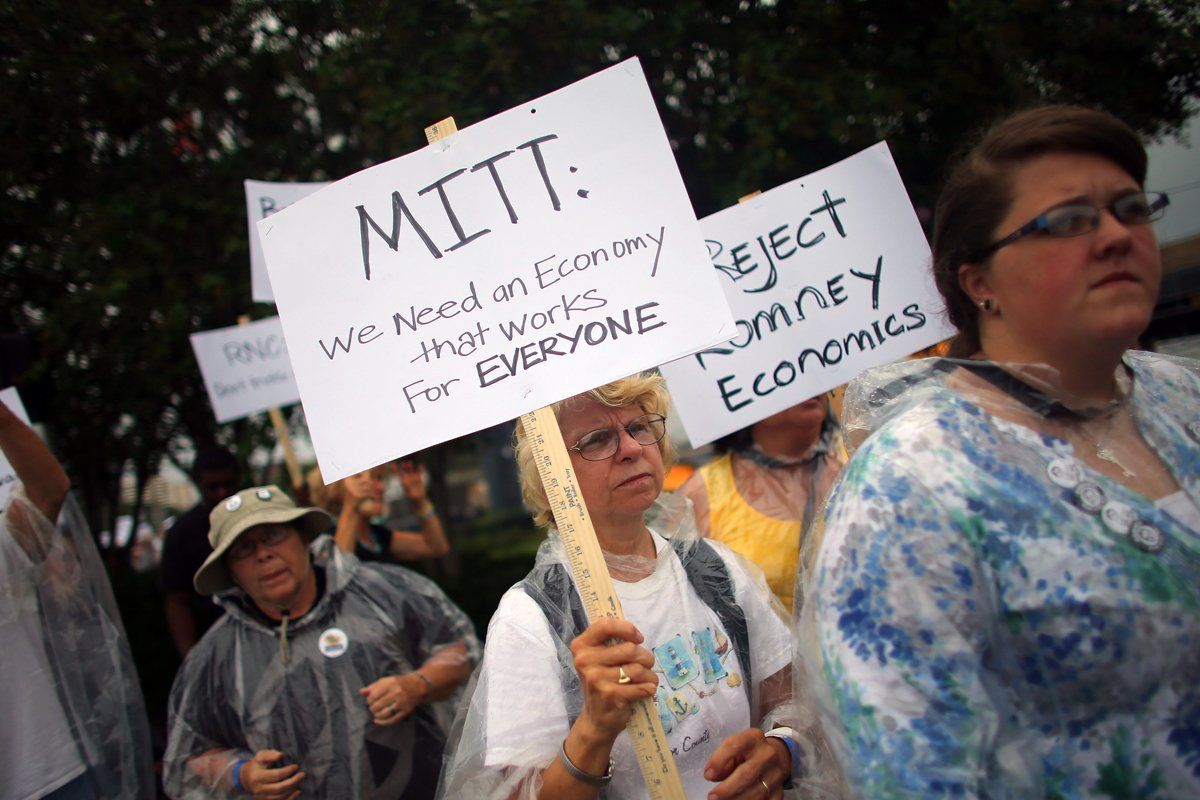
On Aug. 29, Contec Holdings, a Schenectady, N.Y., company that repairs cable boxes, filed a prepackaged bankruptcy plan—a court-sanctioned deal with lenders in which the firm will reorganize, wipe out up to $300 million in debt, and move on under new ownership.
Happens every day. When businesses and consumers reach the point where they can't scrape up enough funds to stay current on their debt, they plead for relief. In 2011, 9,772 businesses filed for Chapter 11 bankruptcy protection, and nearly 1.4 million consumers filed for personal bankruptcy.
Contec was acquired by Bain Capital in 2008, years after Mitt Romney had left the private-equity firm. But the timing of the bankruptcy filing—coming a day before he was poised to accept the Republican nomination for president—was inconvenient. It also highlighted a larger issue. We've heard about "strategic defaults" in housing: when the current value of a home is hopelessly below the total mortgage, some owners stop making payments on their loans even though they could afford to.
Corporate gunslingers do the same thing. When a debt-laden company (like Contec) owned by a private-equity firm (like Bain) runs into trouble, the bespoke-suited bankers have a few options. They can roll up their Thomas Pink shirtsleeves and attempt a turnaround, deploy idle money in their funds to shore up the company, or sell profitable investments in the fund to raise new cash. Or the guys who own the private-equity firm—hell-bent on salvaging the investment and preserving jobs—could use part of their vast fortunes to pay the debt.
They rarely do. In fact, companies owned and effectively managed by billionaires routinely fall behind or default on their obligations, all for want of a few million dollars. LifeCare Holdings, a hospital chain owned by the Carlyle Group, missed a $5.5 million interest payment due Aug. 15 on $119.3 million in notes. It's worth mentioning that Carlyle's top three executives earned a combined $400 million in 2011.
Walking away from bad debts is a feature—not a bug—of the industry. This year Standard & Poor's has tallied 29 major debt defaults by large U.S. companies. By my count, at least 14 were backed by private-equity firms.
The big players rarely suffer professional, legal, or social repercussions if they fail to bail out debt-laden companies in their portfolio. For individuals of more modest means, of course, it's a different story. Thanks to a change in the bankruptcy law in 2005, credit-card debt is no longer easily discharged in bankruptcy. "If you have any ability to pay any of your debt from the point you file bankruptcy forward, you'll be on the hook for it," says Tamara Draut, vice president for policy and research at Demos, the New York–based progressive think tank. Likewise, student loans can't be easily shucked in bankruptcy court.
When a company files for Chapter 11, bankers and bondholders get stiffed. But so do vendors, landlords, service providers, employees—and, sometimes, the public. In 2008, Chrysler and the auto lender GMAC, then both owned by private-equity firm Cerberus, hurtled toward messy bankruptcies when their well-heeled owners decided they were better off walking away. The government controversially stepped in and took ownership of the companies. Taxpayers have taken a $1.2 billion loss on the Chrysler bailout and are still saddled with GMAC. In May, Hawker Beechcraft, the aircraft company owned by Goldman Sachs's private-equity fund and Onex Corp., went tapioca. Over the years, the company had underfunded its workers' pensions by $600 million. So in late August the Pension Benefit Guaranty Corporation, a self-funding agency that is backstopped by taxpayers, agreed to pour in $390 million of its own cash to shore up the pensions.
Is it any coincidence that the first private-equity baron to run for president is proposing something similar? The Ryan plan—now largely the Ryan-Romney plan—is an exercise in walking away. Medicare and Social Security, we are told, are in danger of going bankrupt. That's because these enterprises' wealthy backers—i.e, Washington politicians—have chosen not to fund the levels of expenditures promised to America's rapidly aging population. Rather than raise new funds or reallocate existing resources, Republicans propose to turn Medicare into a voucher program and to consider raising the retirement age for Social Security. Across the country, governors and legislators who repeatedly refused to fund the retirement and health-care benefits promised to state employees are also trying to walk away.
Just like private-equity bosses, political leaders are choosing not to afford financial commitments—and betting they won't suffer any sanctions as a result.
Uncommon Knowledge
Newsweek is committed to challenging conventional wisdom and finding connections in the search for common ground.
Newsweek is committed to challenging conventional wisdom and finding connections in the search for common ground.





